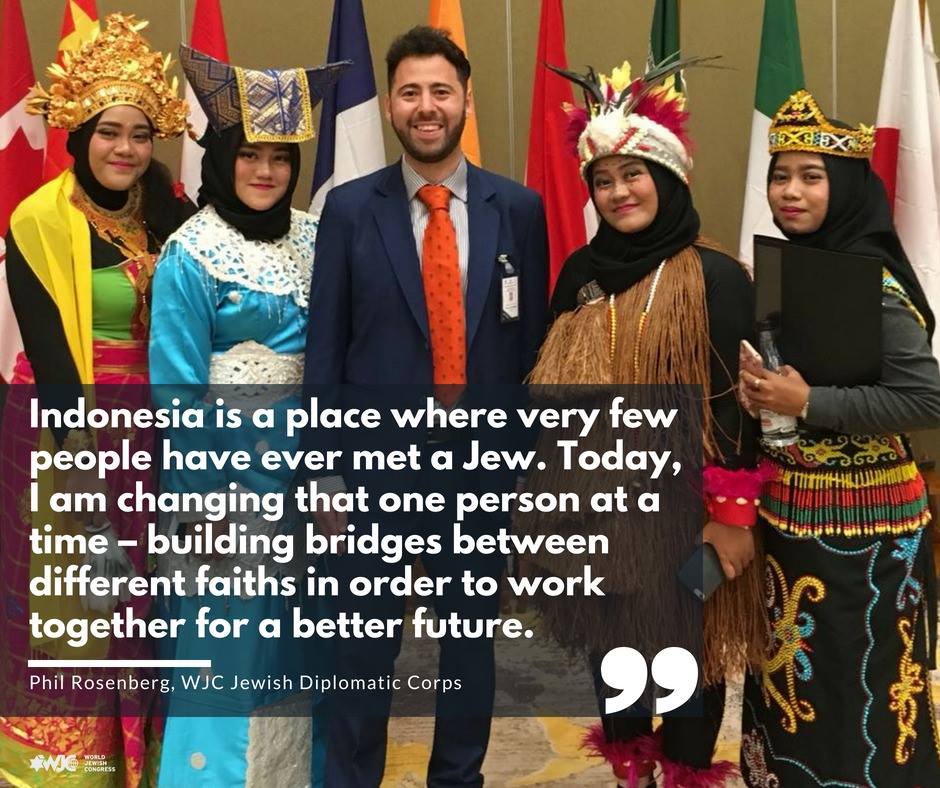The 201st Jew in Indonesia
21 Aug 2018When the World Jewish Congress asked me to attend the 7th World Peace Forum in Jakarta, Indonesia, on behalf of its Jewish Diplomatic Corps, I felt a mixture of excitement and apprehension.
Indonesia is the world’s largest Muslim-majority country with over 261 million people. Estimates are that Indonesia’s Jewish community numbers around 200, or less than 0.000001% of the total population.
My attendance at the conference, alongside Rabbi David Rosen of the American Jewish Committee, would represent an immediate 1% increase in Indonesia’s Jewish presence.
Indonesia is constitutionally secular but its law requires every citizen to carry an identity card that identifies them with one of six religions: Islam, Protestantism, Catholicism, Hinduism, Buddhism or Confucianism. Judaism is not an option.
The country’s Jews must either align themselves with another faith or leave the section blank. Blasphemy is against the law and Christians and Ahmadiyyah Muslims in particular sometimes fall foul of it, in what are sometimes seen as politically-motivated charges. A recent attempt to challenge the law through the courts was unsuccessful.
Identifying as Jewish is fraught with further problems. The 1948-built synagogue in Surabaya, Java, was frequently the scene of anti-Israel protests and was forc ed closed in 2009 by Islamist hardliners. In 2013 it was totally demolished. Nobody claimed responsibility. Now, the only purpose-built synagogue in the whole country is the Shaar HaShamayim in Tondano City, North Sulawesi, constructed in 2003, which caters to 20 people, many of whom discovered ancestral Jewish roots and converted back to Judaism. Chabad maintains a discreet presence in Bali and in Jakarta private services are arranged for the main festivals. Wearing a kippah in public can result in overt hostility.
ed closed in 2009 by Islamist hardliners. In 2013 it was totally demolished. Nobody claimed responsibility. Now, the only purpose-built synagogue in the whole country is the Shaar HaShamayim in Tondano City, North Sulawesi, constructed in 2003, which caters to 20 people, many of whom discovered ancestral Jewish roots and converted back to Judaism. Chabad maintains a discreet presence in Bali and in Jakarta private services are arranged for the main festivals. Wearing a kippah in public can result in overt hostility.
But all this notwithstanding, I was intrigued. The fact that the conference was inviting Jews was surely an encouraging sign. The conference’s theme of the ‘Middle Path’ of moderate Islamic thinking, combined with Indonesia’s national philosophy of Pancasila (‘five principles’) which includes unity and social justice, and the fact that Indonesia is the world’s third largest democracy (after India and the USA) seemed to offer hope for what lay ahead.
In the end, it would be fair to say that the overall experience was mixed. On the one hand, the cause of Palestine was referenced on almost every panel with a default impression that Israel was always in the wrong and the Palestinians had no culpability in the conflict. Iranian and Palestinian delegates went further and suggested that extremism could trump the ‘Middle Path’ should not be applied in Israel’s case.
One media interview I was offered was rescinded on the basis that I was going to be too ‘pro-Israel’, although other media outlets were more open-minded, with a hunger to hear another view.
Being present allowed opportunities to challenge these assumptions, either through interventions at the meetings, through media interviews or through conversations with individuals, including Indonesian Foreign Minister Retno Marsudi.
On a more basic level, there is something powerful to being the ‘first’ Jew that many people had ever met. I temporarily became a minor celebrity, with dozens of people from across Islamic world wanting to take a photo with me in my Kippa.
It caused a positive stir when a Hijab-wearing female leader from one of Indonesia’s biggest Muslim organisations took my hand and we launched in to a spontaneous dance in front of all the delegates. Whilst my footwork probably won’t land me any prizes on Strictly Come Dancing, it was a clear demonstration that another way is possible.